Receive Our Newsletter
For news of readings, events and new titles.
Announcing joint winners
Jonathan Wright and William M Hutchins
For the first time the judges have selected two outright winning translators instead of the usual winner and runner-up. Two enticing and finely translated novels, each in their very different way, captured the judges' attention and passion, leading to the decision to share the prize this year.
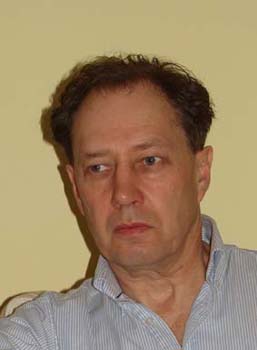
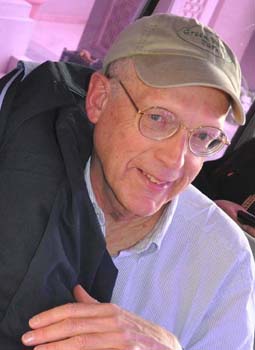
Jonathan Wright William M Hutchins
The prize is shared between:
Jonathan Wright for his translation of Azazeel by Youssef Ziedan, published by Atlantic Books.
William Maynard Hutchins for his translation of A Land Without Jasmine by Wajdi al-Ahdal, published by Garnet Publishing.
The judging panel comprised renowned translator, twice winner and twice runner-up of the prize, Humphrey Davies, playwright Hassan Abdulrazzak and authors Rajeev Balasubramanyam and Meike Ziervogel. They met in December 2013 to select the winning titles from the 21 entries under the chairmanship of prize administrator Paula Johnson of the Society of Authors.
* * *
The Judges' Announcement
THE WINNERS
JONATHAN WRIGHT
for his translation of Azazeel by Youssef Ziedan
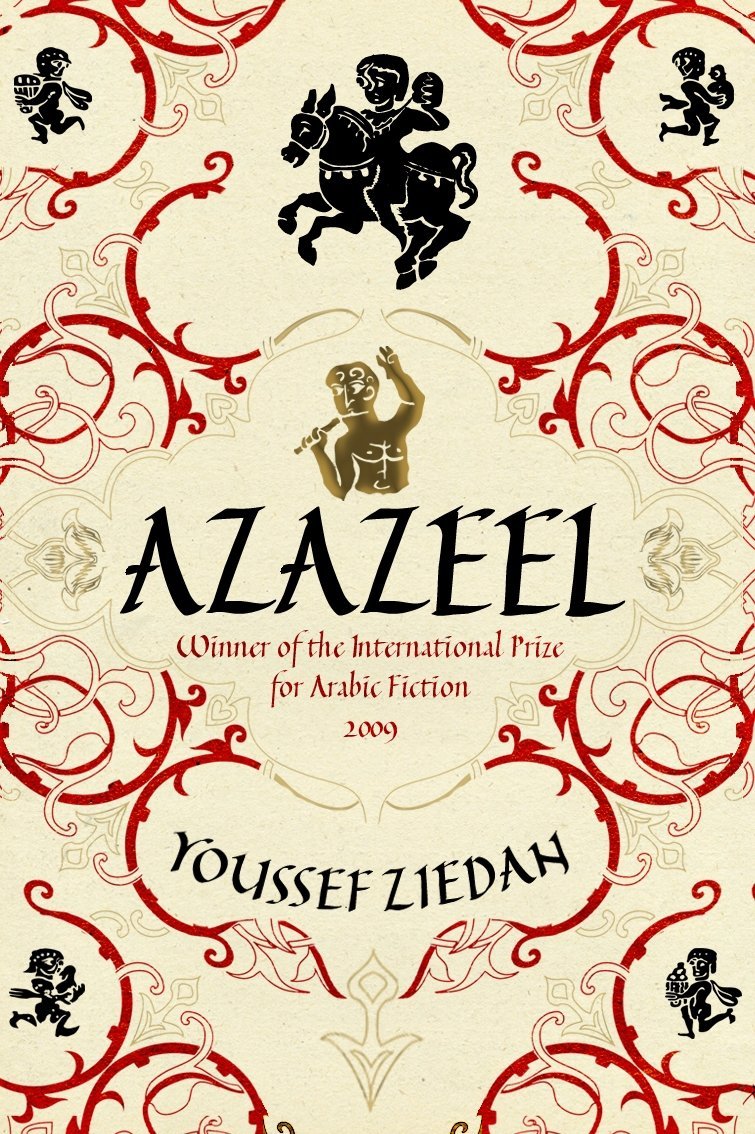
"Azazeel - a masterful achievement, deftly capturing the feeling of the original"
Azazeel
is an enthralling book. The author, and translator, have evoked, and
re-evoked, a time, a region, and people that come alive on the page
despite our distance from them. The conflicts of the day between
tolerance and anathematization – so reminiscent of those of our own time
– are seamlessly embodied in the events. The landscapes appear before
us with palpable and luminous physicality and the protagonist's
strengths and weaknesses, naiveties and intuitive insights, hesitations
and impetuosities combine a character as lifelike and as seemingly
familiar as the subject of a Fayoum portrait. The translation is notable
for its delicacy and well-judged restraint and deftly captures the
feeling of the original.
The book's great strength lies in its strangeness, a product of the state of mind of its narrator as he struggles with demonic possession and spiritual angst. In vivid, evocative prose, the author plunges us into fifth century Egypt, rendered three-dimensional and immediate in vivid, evocative prose. Ziedan has given us a story that works seamlessly on so many different levels; historical, theological, spiritual, and as a feverishly absorbing confession. A masterful achievement.
A beautifully crafted and evocative tale. Rich in description of the arid Syrian landscape and seeped in early history, Azazeel has been flawlessly translated making this an easily accessible story.
WILLIAM MAYNARD HUTCHINS
for his translation of A Land Without Jasmine by Wajdi al-Ahdal
 "A Land Without Jasmine - A gripping page-turner from a gifted and original storyteller, superbly translated"
"A Land Without Jasmine - A gripping page-turner from a gifted and original storyteller, superbly translated"
This
novel deals with many social and political issues such as the sexual
repression of males in a conservative society and the corruption of
public institutions yet it does so in the guise of a thriller that keeps
the reader enthralled. The story is told by several characters whose
accounts do not often tally with one another, leaving room for the
readers to synthesise their own version of the truth. Altogether a
gripping page-turner from a talented writer, superbly translated by
William Maynard Hutchins.
It is a novel which succeeds in addressing issues of sexual oppression and repression without sacrificing narrative tension. Through its use of multiple perspectives we are given a revealing insight into society, reminding us that no event, or place, has an objective existence or truth. Wajdi al-Ahdal is a gifted and original storyteller.
A Land Without Jasmine gives fascinating insight on life in Yemen, with a thriller-like plot that keeps the reader turning the page. In sparse, lucid prose with a tight narrative structure, the author paints a riveting portrait of sexual confusion, frustration and shame. The translation succeeded in creating an enjoyable English read and at the same time preserving the soul of the original.
* * *
ABOUT THE WINNING TRANSLATORS AND BOOKS
Azazeel is published worldwide by Atlantic Books.
UK edition: ISBN 978-1848874299. To buy a copy in the UK click here.
International edition: ISBN 978-1848874282. To buy a copy in the USA click here.
The Arabic original Azazeel won the 2009 International Prize for Arabic Fiction.
On hearing he is joint winner of the 2013 Saif Ghobash Banipal Prize for Arabic Literary Translation, Jonathan Wright said:
"Translating Azazeel was
a real pleasure, so to win a prize for the task is really the icing on
the cake. As I said in my postscript I saw the book piled up on the
pavements of Cairo and heard about it by word of mouth. When I read it I
knew it should be published in English to reach a wider audience. At
the time I had hardly heard of the International Prize for Arabic
Fiction and certainly didn't know that the book had been nominated.
Unusually for Arabic literature, the book has hardly any Arab characters
and is set at a time when Arabic literature didn't exist. That's great.
Why should Arabic literature confine itself to its own little world?
Why not Arabic literature set in China, in space, anywhere?
"In the end this book is Dr Youssef Ziedan's. It's his imagination, his
meticulous research, his lucid prose that have made the book such a
success. He was also very cooperative with my questions and very patient
with the English-language publishers, who sat on it even longer than
publishers usually do.
"This is my first prize, and I'm very
grateful. Those who don't do this kind of work probably don't realise
how long it takes, all alone at a desk for hours and days on end, with
very little human interaction. So to come out in public every now and
then and to be reminded that there is an appreciative readership helps
to make it all worthwhile. Thank you."
JONATHAN WRIGHT Jonathan
Wright studied Arabic, Turkish and Islamic History at St. John's
College, Oxford University. Between 1980 and 2009 he worked for Reuters
news agency in countries across the Arab world including Tunisia, Oman,
Lebanon and Egypt. He has also worked as lead writer in the Washington
DC Reuters bureau as well as chief sub-editor of the World Desk in
London. Short-term assignments for Reuters have included coverage of
Yemen during the 1994 civil war, 1980s Algeria, Palestinian elections
and Saudi Arabia during the 1991 Gulf War,
Jonathan
Wright studied Arabic, Turkish and Islamic History at St. John's
College, Oxford University. Between 1980 and 2009 he worked for Reuters
news agency in countries across the Arab world including Tunisia, Oman,
Lebanon and Egypt. He has also worked as lead writer in the Washington
DC Reuters bureau as well as chief sub-editor of the World Desk in
London. Short-term assignments for Reuters have included coverage of
Yemen during the 1994 civil war, 1980s Algeria, Palestinian elections
and Saudi Arabia during the 1991 Gulf War,
Between 2008 and 2011 he was the managing editor of Arab Media and Society, an online academic journal run by the AUC (American University in Cairo). He has contributed to a number of recent academic gatherings on the subject of the Arab uprisings and Egyptian revolution.
He has translated a number of novels from Arabic to English: Khaled el-Khamissi's Taxi (Aflame Books, 2008, and Bloomsbury Qatar Foundation Publishing); Hassan Blasim's short story collection The Madman of Freedom Square (Comma Press, 2009); The State of Egypt, a collection of essays and articles by Alaa el-Aswany (AUC Press, 2011); Judgement Day by Rasha al-Ameer (AUC Press, 2012); Life on Hold by Fahd al-Atiq (AUC Press, 2012); the Saif Ghobash Banipal Prizewinning Azazeel by Youssef Ziedan (Atlantic Books, 2012); The Iraqi Christ by Hassan Blasim (Comma Press, 2013); Whatever Happened to the Egyptian Revolution by Galal Amin (AUC Press, 2013); and Sleepwalkers by Said Makkawi (to be published by Dar el-Shorouk).
Two of his most recent translations will be published in 2014: Bahaa Abdelmegid's Temple Bar (AUC Press) and Land of No Rain by Amjad Nasser (Bloomsbury Qatar Foundation Publishing).
Jonathan Wright currently lives in London.
YOUSSEF ZIEDAN
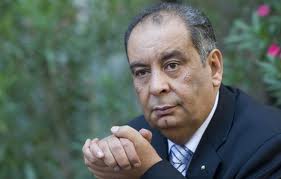 Youssef
Ziedan was born in Suhag, Egypt. He is Professor of Islamic Philosophy
and History of the Sciences, and Director of the Centre for Manuscripts
and of the Museum of Manuscripts at the Library of Alexandria. In
addition to his novels, Zill al-Af'a (The Serpent's Shadow) and Azazeel (Azazeel),
he has written works on literary criticism and edited texts of Sufi
literature in verse and prose. As a well-known researcher on Arab
cultural heritage he has published fifty-four books.
Youssef
Ziedan was born in Suhag, Egypt. He is Professor of Islamic Philosophy
and History of the Sciences, and Director of the Centre for Manuscripts
and of the Museum of Manuscripts at the Library of Alexandria. In
addition to his novels, Zill al-Af'a (The Serpent's Shadow) and Azazeel (Azazeel),
he has written works on literary criticism and edited texts of Sufi
literature in verse and prose. As a well-known researcher on Arab
cultural heritage he has published fifty-four books.
Azazeel, Ziedan's second novel, which won the 2009 International Prize for Arabic Fiction (the "Arabic Booker"), draws on his deep interest in ancient manuscripts and scrolls.
* * *
A Land Without Jasmine, ISBN: 9781859643105, is published by Garnet Publishing.
To buy a copy in the UK click here.
To buy a copy in the USA click here.
WILLIAM MAYNARD HUTCHINS
William M Hutchins is
a professor in the Philosophy & Religion Department of Appalachian
State University in Boone, North Carolina, USA. He began learning Arabic
while teaching at the Gerard School for Boys in Sidon, Lebanon. He
studied at Berea, Yale and the University of Chicago, and began
translating Arabic literature as a postgraduate student, starting with
some of the epistles of al-Jahiz (Peter Lang). During his time teaching
at the University of Ghana in Legon he began translating the plays of
Tawfiq al-Hakim, and later published a two-volume collection (published
by Three Continents Press). He was awarded a National Endowment for the
Arts grant for Literary Translation in 2005-6 for his translation of The
Seven Veils of Seth by the Libyan Tuareg author Ibrahim al-Koni (Garnet
Publishing) and a second one in 2012 for New Waw, also by al-Koni
(Center for Middle Eastern Studies, University of Texas, January 2014).
His translations of Arabic novels include Palace Walk, Palace of Desire, Sugar Street, and Cairo Modern by Nobel Laureate Naguib Mahfouz (Anchor Books); Basrayatha: Portrait of a City by Muhammad Khudayyir (Verso, 2007); The Last of the Angels (Free Press, 2007), Cell Block 5 (Arabia Books, 2008) and The Traveler and the Innkeeper (AUC Press, 2011) all by Fadhil al-Azzawi; Return to Dar al-Basha by Hassan Nasr (Syracuse University Press); Anubis (AUC Press, 2005) and The Puppet (University of Texas, 2010) both by Ibrahim al-Koni. His recent translations are The Diesel by Thani al-Suwaidi (ANTIBOOKCLUB, 2012), a revision of his translation of Return of the Spirit by Tawfiq al-Hakim (Lynne Rienner), The Grub Hunter by Amir Tag Elsir (Pearson African Writers Series, 2012), and his 2013 Saif Ghobash Banipal Prizewinning translation of A Land Without Jasmine by Wajdi al-Ahdal (Garnet, 2012).
His
translations have appeared on wordswithoutborders.org and
brooklynrail.org and in Banipal Magazine of Modern Arab Literature.
WAJDI AL-AHDAL
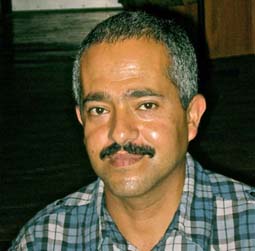 Wajdi
al-Ahdal is a Yemeni novelist, short story writer and playwright,
famous for his controversial works, some of which have been banned in
Yemen. At one point he was forced to leave Yemen for a period of time.
He has won a number of Yemeni literary prizes and has published four
collections of short stories, four novels, a play and a film screenplay.
He was selected as one of the "Beirut39", the Hay Festival project to
promote the 39 best young Arab authors under the age of 40. He has
attended writing workshops in both the USA and the UAE. One of his
novels, as yet not translated, Mountainous Boats (Qawabib Jabailyyah), was reviewed in Banipal 19.
Wajdi
al-Ahdal is a Yemeni novelist, short story writer and playwright,
famous for his controversial works, some of which have been banned in
Yemen. At one point he was forced to leave Yemen for a period of time.
He has won a number of Yemeni literary prizes and has published four
collections of short stories, four novels, a play and a film screenplay.
He was selected as one of the "Beirut39", the Hay Festival project to
promote the 39 best young Arab authors under the age of 40. He has
attended writing workshops in both the USA and the UAE. One of his
novels, as yet not translated, Mountainous Boats (Qawabib Jabailyyah), was reviewed in Banipal 19.
To read more about the prize and previous winners, visit the About the Prize page